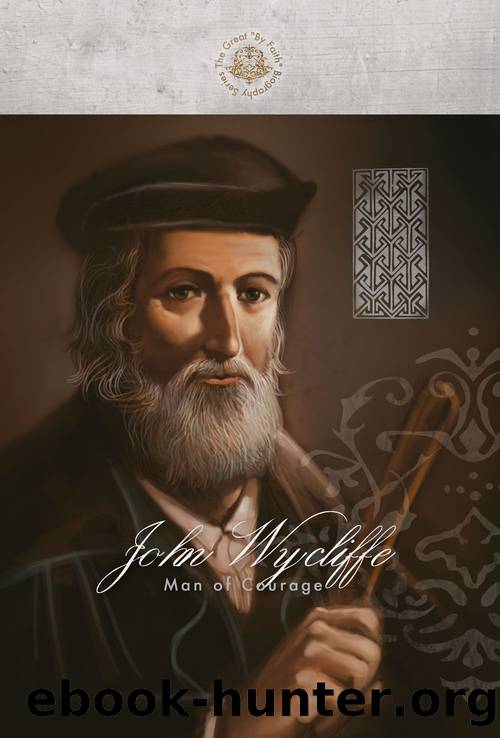John Wycliffe by John Wycliffe

Author:John Wycliffe
Language: eng
Format: epub
Tags: Biography
Publisher: Ambassador International
Published: 2017-09-15T00:00:00+00:00
CHAPTER 7
The English Bible
The entrance of Thy words giveth light; it giveth understanding unto the simple. ~Psalm 119:130
ON MARCH 27, 1378, POPE GREGORY XI died. A short time before his death he returned to Rome, and thus was terminated the âBabylonish captivity,â as the residence of the Popes at Avignon had been called by the Italians.
His successor was elected amidst the threats and tumult of the Roman populace, who demanded a Roman for their Pope. The cardinals elected the Archbishop of Barri, an Italian, who assumed the name of Urban VI.
By his coarse manners, his injudicious severity, and his intolerable haughtiness, he alienated the minds of many from him. The cardinals especially were estranged, and declaring his election null and void, being made under intimidation, they withdrew to Fondi, a city of Naples, and there elected another Pontiff, who was proclaimed as Clement VII. Thus was created the famous schism in the papacy, which for half a century divided and scandalized the papal world.
Urban VI dwelt in the Vatican at Rome, while Clement VII installed himself at Avignon. Germany and England, and some of the smaller European States, sided with Urban; and France, Spain, Sicily, Cyprus, and Scotland espoused the cause of Clement.
The effects of this controversy were most disastrous. Mosheim in his âEcclesiastical Historyâ stated, âThe distress and calamity of these times were beyond all power of description; for not to insist on the perpetual contentions and wars between the factions of the several Popes, by which multitudes lost their fortunes and lives, all sense of religion was extinguished in most places, and profligacy rose to a most scandalous excess. The clergy, while they vehemently contended which of the reigning Popes was the true successor of Christ, were so excessively corrupt as to be no longer studious to keep up even the appearance of religion or decency; and in consequence of all this, many plain, well-meaning people, who concluded that no one could possibly partake of eternal life unless united with the Vicar of Christ, were overwhelmed with doubt, and were plunged into the deepest distress of mind.â
Wycliffe was deeply affected by the events of this papal schism. Soon after its commencement he published his tract entitled âOn the Schism of the Popes.â In this he adverted to the dispute as having divided the hierarchy against itself, and as presenting a powerful inducement to attempt the destruction of those laws and customs which had served so greatly to corrupt the clergy and to afflict the whole Christian community. âEmperors and kings,â he stated, âshould help in this cause to maintain Godâs law, to recover the heritage of the Church, and to destroy the foul sins of clerks, saving their persons. Thus should peace be established and simony destroyed.â
While the rival Popes were launching their anathemas against each other, Wycliffe, who had retired to his country parish, was sowing by the peaceful waters of the Avon, and in the rural homesteads of Lutterworth, that Divine seed which yields righteousness and peace in this world and eternal life in that which is to come.
Download
This site does not store any files on its server. We only index and link to content provided by other sites. Please contact the content providers to delete copyright contents if any and email us, we'll remove relevant links or contents immediately.
Twelve Days of Christmas by Debbie Macomber(3128)
The Kiss of Deception by Mary E. Pearson(2476)
ESV Study Bible by Crossway(2362)
Waking Up by Sam Harris(2042)
7-14 Days by Noah Waters(1867)
Holy Bible (NIV) by Zondervan(1763)
The Harvest: Taken by M.A. Church(1648)
The King James Study Bible by Thomas Nelson(1537)
21 (The List Series) by Rhonda James(1523)
Warrior of the Light by Paulo Coelho(1294)
King of Kings by Unknown(1270)
Savage (Apex Predator Book 2) by David Meyer(1262)
My Daily Catholic Bible, NABRE by Thigpen Edited by Dr. Paul(1248)
Bound by You(1237)
Good with Words by Patrick Barry(1214)
The Falls by Unknown(1187)
The Holy Bible by King James Version(1154)
Proverbs by Zondervan(1138)
Agradecimientos by(1121)
